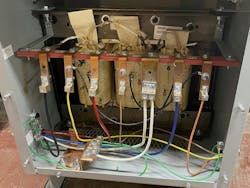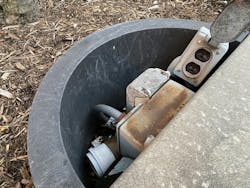Illustrated Catastrophes: Can a System Bonding Jumper Be White?
All references are based on the 2023 edition of the NEC.
Can a System Bonding Jumper Be White?
I often see transformer installations where the installer uses a white wire as the system bonding jumper. Is this permitted? Or is it a violation? Well, let’s look at some of the applicable rules.
Section 310.6 outlines requirements for grounded conductors, equipment grounding conductors, and ungrounded conductors. For insulated grounded conductors, we are referred to Sec. 200.6. For equipment grounding conductors, we are referred to Sec. 250.119. And for ungrounded conductors, we are referred to Sec. 310.8(B)(1), Sec. 210.5(C), and Sec. 215.12(C). But none of these sections applies to a system bonding jumper.
Could the system bonding jumper be black, red, or blue? Yes, it could. There are no Code rules that prohibit the use of these colors or any other colors typically reserved for ungrounded conductors. Can the system bonding jumper be green? Yes, it can. Section 250.119 states conductors with green insulation cannot be used for grounded conductors or ungrounded conductors but does not prohibit system bonding jumpers from being green. Finally, can the system bonding jumper be white? No, it cannot. For circuits of 50V or more, Sec. 200.7(C) restricts the use of white or gray insulation to only grounded conductors unless part of a cable assembly where the insulation is reidentified for use as an ungrounded conductor or in flexible cords used for connecting appliances or equipment per Sec. 400.10.
“Old School” Installation
This installation is pretty old and was probably completed way before the 2023 Code existed, but it still makes for good discussion. I spotted this same type of installation in several planters along a public sidewalk. When I looked at previous editions of the Code, I learned that many revisions have happened over the years addressing the enclosures for receptacles installed in wet locations. In 1987, Sec. 410.57(b) stated “a receptacle installed outdoors where: exposed to weather or in other wet locations shall be in a weatherproof enclosure, the integrity of which is not affected when the receptacle is in use (attachment plug cap inserted).” In 2008, Sec. 406.8(B)(1) was revised to require all 15A and 20A, 125V and 250V nonlocking receptacles in wet locations to be listed as weather-resistant type. Section 406.9(B)(1) of the 2023 edition requires 15A and 20A, 125V and 250V receptacles installed in a wet location to have an enclosure that is weatherproof whether or not the attachment plug cap is inserted. The exception permits the use of enclosures that are weatherproof when the attachment plug is removed to accommodate routine high-pressure spray washing. While this installation may or may not have been Code-compliant when it was originally completed, it does not comply with today’s requirements.






